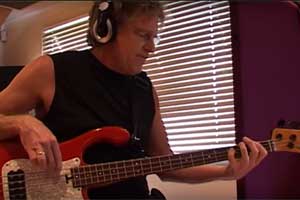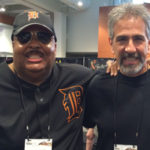Seasoned groover talks about the tours, the books and the Robin Trower gig plus sessions for Gregg Allman and Orville Redenbacher. Our very first interview!
Exclusive interview with FBPO’s Jon Liebman
June 15, 2009
Glenn Letsch has spent decades playing bass in a variety of musical settings, both live and in the studio. He’s also a prolific writer and educator. Now on the road with the Robin Trower Band, Glenn took some time to talk about life, career and playing the bass.
FBPO: You’ve got quite a diverse background. You’re currently touring with Robin Trower and you’ve played bass for Gregg Allman, Ronnie Montrose and so many others. Your recording career includes everything from Orville Redenbacher popcorn commercials to The Sims computer game. Where did your career begin and how did it take you in so many directions?
GL: My career began in Connecticut. I had just graduated from Central Connecticut State University and started a gradute program at Fairfield University to become a school psychological examiner. But I needed to pursue my passion for music. I was offered a gig in a working band and planned to take a semester off to join the band and see if the music career was feasible. The more I played, the hungrier I got for success as a musician. My wife suggested I really go for it, so we moved to Los Angeles. It was the best thing I ever did! I met Ronnie Montrose right away and was asked to join his band. That led to a lifelong friendship with the singer of the band, Davey Pattison, and that led to me becoming the bass player for Robin Trower.
FBPO: I understand you did a lot of session work along the way. What insights can you share about what it takes to do that kind of work and where does it fit in as a component of your overall career?
GL: To be successful as a session player you must have a great attitude, be easy to work with, deliver a great tone for the engineer and play to a click track effortlessly. Reading music helps too. In my experience, I tried to be the best bass player I could be. I realized early that to have longevity, a musician must reinvent himself from being just a band member to being a teacher, writer and session player. Also, you do not stay busy by waiting for the phone to ring. Stay busy and focused and good things may happen.
FBPO: Tell me about the crowds that come out to the Robin Trower concerts – I assume people are coming out to hear the old hits. When I think back to Robin’s heyday in the ‘70s, I imagine more than a few long-haired, pot-smoking rock & roll fanatics. Would you say these same people are coming out, most of them having become more, shall we say, “dignified,” or is the show attracting a young crowd that’s just now becoming hip to his music?
GL: The crowds are diverse. Certainly baby boomers are a large part of an enthusiastic audience. But, their sons and daughters are coming to the gigs so the next generations are learning about the Robin Trower Band and really digging it. The gigs are nearly all sold out so the crowds are roaring by the time we hit the stage.
FBPO: Talk about your career as a writer and educator, particularly the books and videos you’ve had published.
GL: I think the transition from just player to writer and educator was a natural progression, mainly from having gone to college. I loved the college experience and recommend it to everyone. It sets the table for whatever vocation you choose. You learn how to write and critically think when you really embrace higher education. When Arlen Roth (owner of Hot Licks Videos) asked me to do an instructional video, it seemed like a logical thing to do, as I had been teaching for several years. When I was approached by Hal Leonard Corporation to write my first book, I jumped at the chance. The publishers seemed to like what I did, so they kept asking me to write more books. Bass Player magazine asked me to write a monthly woodshed, and five years later I had written 50+ columns. My latest book, James Brown, is focused on accurate analysis of classic James Brown bass lines. I’m a stickler for getting it right because in the end, it’s either right – or not right. There is nothing in between. How can the next generations learn how to play James Brown funk if the books do not present the details exactly as they were recorded? I’ve taken that approach with every book I have written.
FBPO: Having played everything from country to rock (and even “popcorn”), what music do you find the most satisfying to play?
GL: I enjoy playing “the groove” so anything that is grooving gets my attention straight away.
FBPO: What do you like to do that’s not musically oriented?
GL: Travel with my wife and daughter. Italy is next on the agenda for us. We just traveled to England and France. We went to Abbey Road, Churchill’s War Room, Paris, Normandy and the American Cemetery above Omaha Beach. That was moving beyond all words.






